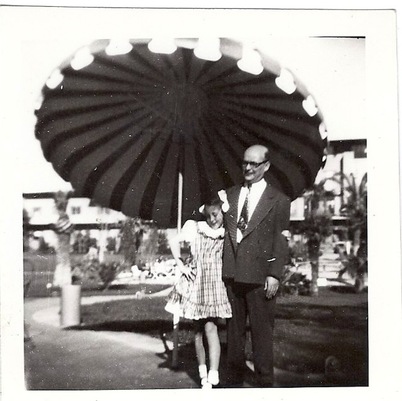 The accountant and his daughter in 1947 People my mother considered common were at the top of the order in Las Vegas. The hotels were their playgrounds. They had nicer cars, more expensive clothes, more privileges than the rest of us. And more power. Ed Reid in The Green Felt Jungle described “little Moey Sedway” as “a tiny guy with a large nose and moist, close-set eyes, who talked freely from both sides of his mouth . . . a punk . . . Bugsy Siegel’s personal flunky.” Ed Reid didn’t know Mr. Sedway the way I did. Moey hosted all of the social events for Mr. Siegel’s staff. He drove a big, black car, smoked imported cigars and had a beautiful mistress who wore mink to Friday night services, while my mother muttered “scum” under her breath, and whose daughter was in my Sunday school class. At parties, he was gracious, soft-spoken, and even playful. He had a fuzzy red bird toy that balanced on the rim of a cocktail glass and bobbed up and down. I thought he was the most sophisticated grownup I knew.
And then there was Benjamin “Bugsy” Siegel, my father’s and Moey’s boss. Handsome enough to be in the movies, he would bounce me on his knee and give me silver dollars for my piggy bank. My mother had a crush on him. She’d say, “Why can’t your father be more like Benny? He’s so refined.” She had no idea he’d murdered twenty or thirty people. My father probably knew, but he never said anything. He worshiped Siegel. Benny had monogrammed shirts made for him, and picked up the tab when the Sharniks from Detroit and California were in town. Irving was making good money in those days, especially after the Flamingo opened. He was promoted to head of skimming. I had no idea what that meant. I thought it referred to the skin on hot chocolate. I pictured my dad in a chef’s hat with a little ivory handled knife. What did I know?
My mother was actually happy in those days. I remember when she came home from a New Year’s Eve party at the Flamingo. She had a paper hat on. She sat on the edge of my bed and told me about the cocktail waitresses in net stockings and the celebrities and the caviar and champagne. Seven months after the Flamingo opened Benjamin “Bugsy” Siegel was shot full of holes in his mistress’s house in Los Angeles. They never found out who did it. Everybody thought Meyer Lansky gave the order, but my father said he had a lot of enemies. Beldon Katleman, of the El Rancho hated Siegel’s guts. When Bugsy tried to horn in on the El Rancho, Katleman had him pistol whipped in front of everybody at the pool and dumped in the desert. Then, Bugsy goes and builds the Flamingo, like a slap in Katleman’s face.
My dad lost his job at the Flamingo. Nobody wanted to hire him because of Siegel. Finally, Moey Sedway gave him a job at the Golden Nugget as a dealer. He had been demoted. He and my mother started yelling and screaming about money again. Colliers Magazine did an article about Vegas that featured a full-page photograph of my dad dealing cards at the Nugget. The caption read: The Empty Face of Las Vegas. He thought it was a compliment. My mother and her family were mortified. Our lives might have been very different if Siegel had lived but, as I realized when I was older, we wouldn’t have been safe. In Las Vegas, you’re better off being a nobody.
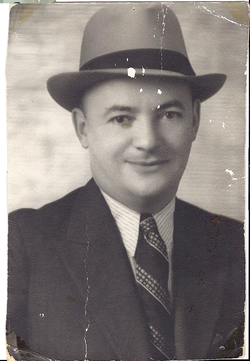 My mother called them the scum of the earth. They came to Las Vegas from Miami, Chicago, Detroit, New York, to buy respectability. Back where they came from, Mother said, nobody would even spit on them. In Vegas, they were the crème de la crème.
When I was about seven, my mother and I were invited to the El Rancho to have lunch poolside with the wives and daughters of some of the bosses on the Strip.
My mother seemed to fit in with the other mothers right away. I only remember Mrs. Moss and her sweet, chubby, red-haired daughter, Terry, and Mrs. Frank Soskin, and her beautiful ten year old daughter, Linda. I recognized them from the Jewish Community Center but didn’t know them well enough to say anything, so I sat on the pool steps and thought about the time I almost drowned in the El Rancho pool. It was before we moved to Las Vegas. I was four. A lifeguard fetched me out of the deep end and gave me artificial respiration. I thought my mother would be mad, but she treated me to tea and cookies in our bungalow. At seven, I still couldn’t swim, but there was no need to watch over me. I had learned not to wander into deep water.
Terry Moss joined me on the pool steps. I was surprised at how nice she was. Terry’s family was from Chicago. Her mother was Catholic, but she didn’t object to raising her kids Jewish. Terry’s father made lots of money but, like me, she didn’t know what he did for a living. We both thought Linda Soskin was the most beautiful ten year old we’d ever seen, including movie stars. She was stretched out on a beach towel at the deep end of the pool applying Coppertone to her arms and legs. Her pale blue bathing suit had just one strap; her other shoulder was bare. Her long, brownish blonde hair hung halfway down her back. She was wearing pale, pink lipstick. The other girls joined Terry and me on the pool steps. Linda stayed where she was, probably because she knew we were all watching her, and she loved being watched. The girls asked me where I went to school, where I lived. I could tell from their faces that they considered Bonneville Ave. a place where poor people lived, so I said we were just renting until our house was ready, which wasn’t a total lie since we were house hunting. Terry’s parents were having a house built; in the meantime, they were staying at the El Rancho. The other girls were waiting for their houses, too, and staying at the El Rancho or the Last Frontier. I wished I were back in California where everybody we knew lived in apartments. Linda stood, stretched, and sauntered over to us. She asked if anybody wanted lemonade. We all squealed.
Linda called the waiter. He scribbled on his order pad and referred to her as Miss Soskin. All of us crowded next to our mothers, nibbling on their chef’s salads and club sandwiches, and sipping their ice teas. My mother had a dot of mayonnaise on her chin. It seemed like forever before the lemonades arrived. The waiter placed a large tray on one of those folding things. There they were: tall, thin, elegant glasses of lemonade filled with crushed ice, and adorned with tiny, pink paper umbrellas. Linda signed her name on the pad. She didn’t even have to pay! I watched while the other girls took their drinks from the tray. I was worried that I didn’t have one because Linda didn’t really know me, and my father wasn’t rich, but there was one lemonade left on the tray. It had to be mine. A dark, hairy man in a bathing suit and sunglasses put his hand on my shoulder. “That’s my lemonade, little girl.” He took the glass out of my hand. On the way home, my mother said catty things about the other women. She considered them beneath us. I knew better.
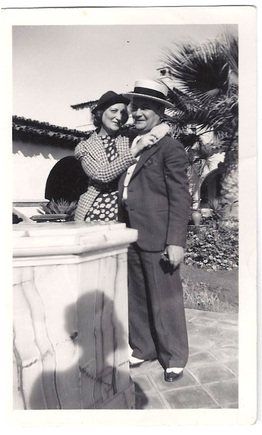 Irving and Sara courting in California When Sara Abrams and her cousin Rosaline Kanter decided to take a two-week vacation to California, a mutual friend suggested she look up Irving Sharnik in Los Angeles. Irving showed her around, took her out for dinner, even brought her flowers. His parents and his sister Shirley had her over to the house on DeLongpre. By the time she left for Cincinnati, Irving was smitten. Sara never expected, or wanted, to see him again. He proposed by mail. Before she knew it, Sara was engaged. The night before the wedding, she begged her mother to call it off. Her mother pointed out that it wouldn't be fair to the guests who were coming from as far away as California. She convinced Sara to go through with the wedding, and go on the honeymoon to Yellowstone National Park. “You don't have to do anything,” her mother said. “Come home. Your brother, Harry, will have it annulled.”
In Yellowstone, Irving slept on the couch. The night before Sara was to leave, he got on his knees and begged her to stay with him. He would treat her like a queen, she would
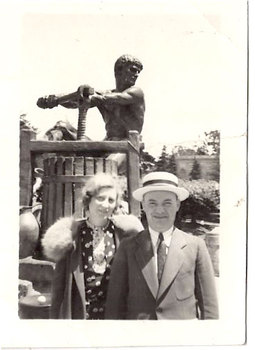 Irving and Sara on their honeymoon never have to work. He would get a job at Convair in San Diego. He would never gamble again. Sara closed her eyes and imagined her life as an old maid in Cincinnati, living with her parents, typing reports for the government, baby-sitting her brothers’ children. She opened her eyes and saw a short, bald, uneducated man who loved her enough to support her. That night, Irving did not sleep on the couch.
Sara loved San Diego. And Irving kept his promise. They might have lived happily ever after, but the job at Convair didn’t last. It seems they found out that Irving had a record. He had taken a rap for some gangster in Newport, and spent a year or two in the Pen. He considered it an honor. Convair didn't. Irving found another job at a dog track in Tijuana. He met Benny Siegel. Sara went home to Cincinnati. “I left the bum.” She was diagnosed with a fibroid tumor the size of a grapefruit. If she wanted a child she would have to act fast. She went back to Irving. I was born nine months later.
Las Vegas, in the forties, was for people who had nowhere else to go.
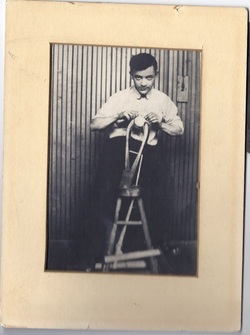 Irving, age 13, making baseballs in Cincinnati My father only loved two people in his lifetime: my mother and Bugsy Siegel. Well, three, if you count Grandma Sharnik. I used to pray he wasn't really my father. I didn't look like him, didn't act like him. I wished he would go away. I'm sure he wished I'd do the same. Most of the time, he ignored me, except in front of other people when I was all dressed up: “Looks just like her mother.”
I couldn't imagine two people less suited for each other than my parents. He was short, swarthy, bald. She was tall and pale, with thick, dyed blonde hair. She didn't approve of gambling. She complained about his personal hygiene. For good reason. He didn't shower on a regular basis, didn't
bother with deodorant. But his fingernails were immaculate. He had them done by a manicurist on First Street. Gamblers are fussy about their hands.
My dad wasn't always a gambler. He was born in a small village near Moscow and came to America in 1900 when he was about ten, along with his parents and his three younger sisters: lovely, intelligent, classy Anne; bitter, homely, spiteful Shirley; and coarse, flea-brained, sexy Rose. The Sharniks
settled in Cincinnati, Ohio, my mother's home. They even stayed with her family before they found a place of their own, and my mom was a bridesmaid at classy Anne's wedding to dapper John Keystone from Canada.
At thirteen, my dad displayed a remarkable facility for doing complicated math problems in his head, a talent which would serve him well in the mob. He quit school after third grade because he was bored, ridiculously out of place with all the eight year olds, and found a job in a factory making baseballs. I have a picture of him sitting behind a loom, looking like one of the street kids from “The Bowery Boys.” That was the first of only two legitimate jobs he would have in his life. A few years after quitting school, he fell in with a gang of lowlifes and ne'er-do-wells who lured him across the bridge from Cincinnati to that den of iniquity known as Newport, Kentucky, where he fell in love for the first time. Her name? Farobank.
According to my mother, who heard it from my aunt Shirley, my father underwent a dramatic personality change after a business trip with his dad while in his teens. It seems his father had a mistress. Shades of “Death of a Salesman!” Shirley claimed that, after that trip, my father stopped talking and aged ten years. Then there's the story, which may or may not be true, about how my dad lost his hair at the tender age of eighteen. His sister, sexy Rose, was a leggy blonde who loved palling around with the boys. Prudish Irving disapproved. When Rose attempted to leave the house to meet her boyfriends, Irving barred the way, and a struggle ensued, during which she grabbed hold of his hair and literally snatched him bald. On the other hand, Grandma Sharnik insisted that her son's early hair loss was the result of a tongue operation when he was a baby. Nobody took her seriously.
I never met my grandfather, who died of stomach cancer a year before I was born, but my mother filled me in. He was tall, handsome, well built, articulate and a spiffy dresser. Ladies adored him. My mother often wondered aloud why he married my grandmother when she looked like a monkey and could barely speak in sentences. In all fairness to Grandma Sharnik, my aunt Ann told me she was a talented landscape painter who encouraged her children to appreciate the arts. Then again, Aunt Ann was lavish with her praise of all things Sharnik.
Sharnik, which should be Shornik but they messed up on Ellis Island--means harness maker in Russian, and was the occupation of many generations of Shornik men. As automobiles began to replace the horse and buggy, my grandfather began to look for a new profession, and eventually moved the
family from Cincinnati to Detroit to work for the Dodge brothers. After classy Anne and sexy Rose married, my grandparents and spiteful Shirley moved to Hollywood to pursue the American Dream. That dream took the form of a little nut stand tucked into a spacious driveway on Hollywood Blvd.,
across the street from Dupar's Cafeteria. Grandpa's roasted nuts became the talk of the town, beloved by movie stars and moguls. It is said that Shirley almost fainted when Errol Flynn stopped by for a bag of cashews; Grandma Sharnik told him he was so handsome he should be in the movies. The success of the nuts made it possible for the Sharniks to buy a little house on DeLongpre Ave. where Shirley planted trees and flowers in their tiny backyard, and began a lifetime obsession with parakeets, canaries and antique doorknobs. Irving, who had moved to California before them, was a
frequent visitor at their dinner table.
Eventually, Grandpa Sharnik entrusted his nuts to his wife and daughter and spent most his days philosophizing about life on the beautiful beaches of southern California, waiting until the ocean was cold as ice before plunging fearlessly into the waves. My mother said her father-in-law took to the
beaches because he couldn't stand to be around his wife. She also confided that Grandpa was a card carrying Communist, which thrilled me no end when I was a college student going through my wild-eyed radical phase. I was sad that I never knew my grandfather. I'd have loved to have sat on the beach listening to him talk about communism and capitalism and Arthur Miller.
After my grandfather died, Grandma Sharnik and spiteful Shirley bought a big store on the Boulevard and called it The Hollywood Nut Shop. Mother said they were the biggest nuts in the place. Shirley grew more and more bitter about being stuck taking care of her sickly mom while her sisters had
husbands and children and spent their days lounging around having tea and chocolates. When I was little, my mother would leave me at the nut shop while she shopped and did errands. I loved the rock candy, but Aunt Shirley scared me. I will never forget the time a lovely woman, beautifully dressed,
very refined, came in to buy a dried fruit gift package to send her husband who was overseas in the war. She asked Aunt Shirley about gift wrapping. Aunt Shirley's eyes burst into flame. WRAP IT YOURSELF! She was obviously jealous of this married woman whose brave husband was over there fighting the Nazis. Shirley thrust a role of white paper and some scotch tape at the woman. I expected her to leave without paying. To my dismay, she smiled, then did as she was told. I was shocked! I could be afraid of Aunt Shirley, I was just a little kid, but this was a grownup, and not just any grownup but a beautiful lady in movie star clothes. She should have had the wherewithal to protect me from the Aunt Shirleys in this world instead of making me feel even more helpless and vulnerable.
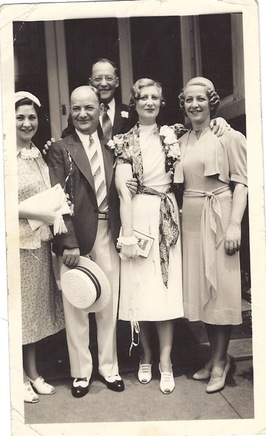 Irving & Sara wedding picture, with Irving’s sisters Anne and Rose and Irving’s father Years later, when my grandmother and aunt had sold the business and settled into a safe, dull, lonely existence on DeLongpre Ave., Shirley met a man, a Russian immigrant who had made a fortune in the Texas oil industry. A widower. His niece, a close friend of the Sharnik's, introduced them. He took her to restaurants, movies, art museums. Shirley laughed, she sang to her parakeet, she danced around the house. She was nice to everyone! The only problem was Grandma Sharnik. The old woman told Shirley she was crazy. Love, at her age? And when Shirley's suitor proposed marriage, and offeredto take her back to his ranch in Texas where they would build a little house for her mother, Grandma Sharnik said she wouldn't go. Thrilled for their sister, Anne and Rose advised her to go, they would talk to their mother, she would come around. Shirley accepted his proposal. When her fiance returned to his niece's house he told her the good news. In the morning, he didn't appear at the breakfast table at the usual time. His niece knocked at his door. There was no answer.
I may have hated Aunt Shirley when I was a child, with good reason, but the story of her lover's death broke my heart.
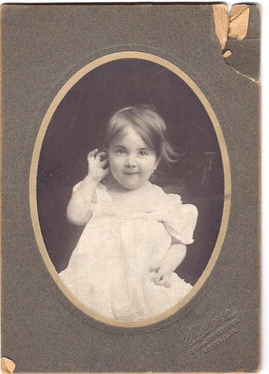 Sara as a baby around 1901 My mother, Sara Ruth Abrams, was born in Louisville, Ky., and grew up in Cincinnati, Ohio. She had six brothers, one of whom died as an infant. Her mother, Rebecca Kanter Abrams, was often sick with “female problems,” so it
was up to her father to raise the children. At one point, my grandfather, who worked long hours at a factory, could no longer care for the children and was forced to put them in an orphanage where they were separated, and fed daily doses of loathsome concoctions for no apparent reason but sheer cruelty.
My grandparents met on the boat that took them to America. My grandfather came from Russia. Rebecca's Lithuanian parents looked down on Russians. But
their book-loving daughter loved her Russian peasant boy the moment she laid eyes on him. My mom described her uneducated father as a good-natured, funny, born storyteller who had little respect for schooling. He didn't
think education led to making a living. My grandmother, on the other hand, was proud of her high school diploma and insisted that her children take their schoolwork seriously. She didn’t have to encourage her boys, especially Lou, her science whiz kid, who skipped four grades and graduated from high school at the top of his class. Lawyer Harry, Math marvel Max and Doctor Nathan were also high achievers. Lazy Manny and Silly Sara, were not.
In truth, Sara was a gifted writer. She often earned pocket money writing essays for her schoolmates. In response to endless praise for her older brothers she became the class clown. It was she who pinned the sign “KICK ME HARD” on the back of her teacher's apron. As such, her father was forever pleading with her teachers to take his prankster daughter back. He pretended to be upset, but on some level she knew he was proud of her. After high school, Grandpa Abrams tried to talk his sons into working for his businessman brother in Louisville, Ky., but they worked their way through
college. Their father called them educated fools. Though her brothers offered to pay for college, Sara chose to live with her parents and work as a crack typist for the government, which was to come in handy when her father was laid off during the Depression.
My mother was not a hit with boys. It could have been that she was a prude who carried “walking home” money in her shoe in case a date tried to squeeze her privates. More likely, it was coming from a family of high achieving boys. Sara wasn't expected to excel. She was expected to crochet, and
embroider, and cook, while her brothers were at Hebrew school or playing baseball. Sara wished that she'd been born male. Her own mother made it clear that she preferred her sons to her only daughter, and found poor Sara to be rather dull, and annoyingly self-pitying. It's not surprising that
Sara found herself an old maid in her early thirties.
I hated Las Vegas. My parents were constantly fighting, yelling, screaming, throwing. She threw. He ducked. The swamp air conditioner banged and clanged. And it was hot. A hundred and ten in the shade, according to my mother. But though I hated the heat, and the fights, and just about
everything else, I loved the shows. Every Saturday night, my father took us to the El Rancho or the Last Frontier. I saw Sophie Tucker, Joe E. Lewis, Eddie Cantor. I memorized the jokes. Performed them in my bedroom closet when my parents were going at it.
When I was five, or six, we went to see Joey Adams at the El Rancho. It must have been my birthday or something, because my mom had pinned a big pink taffeta bow in my hair, and flowers in hers. About three jokes in, Adams noticed me. "Hello, sweetheart."
My parents beamed. When he asked me to join him on stage, the whole audience went "Aw!" My father, who was usually devoid of personality, grinned so hard you could see the top of his false teeth. I skipped over to the steps, but the minute I was on stage, with the spotlight on me, I felt like running back to my parents and hiding under the table. Joey Adams took the mike off the stand and knelt down.
"Where are you from, sweetheart?"
"Las Vegas." My voice sounded like it belonged to someone else.
He got up and looked at the audience.
"Las Vegas? I didn't know they allowed children in Las Vegas!" Everybody laughed, including my parents, and I laughed. I didn't want anybody to think I was stupid. We chatted. He told a few jokes I'd heard before. Then he asked what my father did. My legs turned to butter. I didn't know what my father did. Nobody had ever told me.
"It"s alright, sweetheart.." I was sure every other kid in America knew what their father did. I was afraid to look at my parents. Joey Adams put the microphone back on the stand. I was a failure.
He didn't want to talk to me any more. Then I remembered something I'd heard my uncle Manny say on the phone. I tugged at Joey Adams' arm.
"He works on the book," I said, and there was a big pause.
"Oh, you mean he's a bookie?"
And I said, "Yes! That's it! He's a bookie."
The audience roared. I roared. I looked at my parents. They weren't laughing.
When we got home, my mother made me write a-c-c-o-u-n-t-a-n-t twenty-five times.
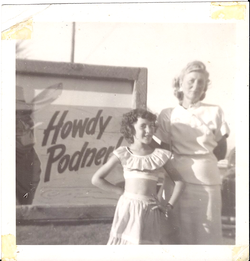 When I first moved to Las Vegas, in 1944, there were two hotels-- the El Rancho and the Last Frontier. Nobody thought it would last. There was no real industry, except gambling. Land was selling on the Strip (except it wasn’t called the strip yet) for twenty five bucks an acre. In those days, if you told somebody you lived in Vegas they’d say, “You gotta be kidding. Nobody lives there.” And my mother, who grew up in Cincinnati, Ohio, would say, “It’ll never last. It’s a million miles from nowhere.”
My mother and I didn’t move to Las Vegas until I was five. My father was already there, working for his hero, Benjamin “Bugsy” Siegel. We were in L.A., living with my grandmother, on Dunsmuir St. near the May Company, because Mother didn’t want to raise her precious only child in that “hell hole.” So, we would visit my father two, maybe three times a year, depending on how he was doing at the crap tables, and we would stay in a little bungalow at the El Rancho. When he visited us, my father stayed with his mother and sister on Delongpre Ave. in Hollywood. My parents weren’t exactly close.
In fact, for years my mother was trying to build up the courage to divorce my father. Not just because he moved to Las Vegas when I was two. She didn’t want to be stuck with a gambler the rest of her life. She would listen to “The Romance of Helen Trent,” every morning on the radio. Helen was a divorcee. Men fell in love with her left and right even though she was over 35. My mother was over 40. Helen gave my mother hope.
The hope didn’t last. My grandmother, who was my best friend in the whole world, died of a heart attack, and we had to move. Mother wanted to divorce my father and move back to Cincinnati, but my Uncle Max told her she was nuts! What did she think, she could move back to Cincinnati and have men at her feet at her age with a kid, when she already had a husband in Las Vegas who was willing to support her?
So we moved to Las Vegas. Only we didn’t get to live in the little bungalow at the El Rancho Hotel and have tea in a pot and cookies on a tray. We lived in a duplex on Bonneville Ave. with a mean landlady named Miss Bliss and a broken air-conditioner.
|








 RSS Feed
RSS Feed